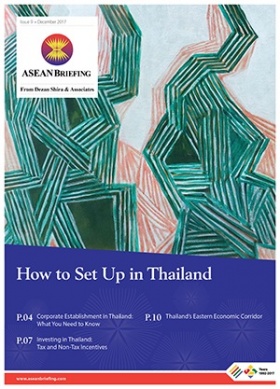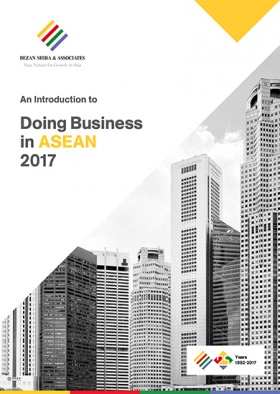Thailand’s Investment Outlook for 2018
By: Vasundhara Rastogi
Thailand is a fairly developed economy with an upper-middle-income status. Situated in the heart of Southeast Asia, the country serves as a gateway to one of the world’s most dynamic markets. Despite a decade of political instability and economic shocks, the economy grew at a rate of 3.7 percent in 2017 and is expected to touch 4 percent in 2018, led by strong exports and a vibrant domestic consumer market. However, in comparison to some of its neighbors, the country’s growth rate is among the lowest in Southeast Asia.
Investment climate
Though a moderately-growing economy, Thailand offers abundant resources and a skilled and cost-effective workforce for foreign investors. Thailand has a well-defined investment policy framework that encourages liberalization and promotes free trade. The government, through its several agencies such as the Board of Investment (BOI) and the Industrial Estate Authority of Thailand (IEAT) and its many bilateral agreements, offers numerous tax and non-tax incentives to support investors. Investors can significantly gain from agreements such as the ASEAN Comprehensive Investment Agreement (ACIA), the ASEAN Framework Agreement on Services (AFAS), and the Treaty of Amity and Economic Relations between Thailand and the US (Treaty of Amity).
The Foreign Business Act of 1999 is the chief law that governs most investment activities by foreign nationals. Since its implementation, the Act has opened several new business sectors to foreign investment, and increased maximum ownership stakes permitted in some sectors above the standard 49 percent limitation. The law restricts foreign-majority participation in certain businesses; however, this restriction does not apply to most manufacturing ventures.
International surveys such as the World Bank’s Ease of Doing Business report have recently ranked Thailand among the most attractive investment destinations in Southeast Asia. The 2018 report moved Thailand up to rank 26 from rank 46 in 2017, bringing the country among the top three investment destinations in ASEAN.
![]() RELATED: Pre-Investment and Market Entry Advisory from Dezan Shira & Associates
RELATED: Pre-Investment and Market Entry Advisory from Dezan Shira & Associates
Economy
Thailand’s economy is heavily export-dependent, with exports accounting for more than two-thirds of its total gross domestic product (GDP). Some of its major exports include computer hardware, motor vehicles and auto parts, jewelry and electrical circuits. Crude oil, machinery and parts, and alloy steel and steel products are the top import products.
Sector-wise, the industry and service sectors account for about 90 percent of GDP. Thailand has a diversified industrial base and is known for manufacturing electronics, steel and automotive around the world. The country is an assembly hub for international car brands.
The service sector, including tourism and financial services, employs nearly 38 percent of the active population. The country is among the top 10 travel destinations in the world.
The agricultural sector, comprising mostly of small-scale farms, contributes less than 10 percent of GDP but employs about one-third of the labor force. The country is one of the leading producers and exporters of rice and also has rubber, sugar, corn, jute, cotton, and tobacco as major crops. Fishing is also an important economic activity with farmed shrimp being a major export item.
Government initiatives 2017
In 2017, the Thai government amended the Investment Promotion Act B.E.2520 (1997) by Investment Promotion Act B.E 2560 (2017). The new legislation broadens the scope of incentives – both tax and non-tax, offered to foreign investors. For instance, the exemption of import duties which was previously limited to materials used for manufacture for re-exportation has now been revised to include materials imported for use domestically in research and development activities and related testing.
The government also announced the new National Competitiveness Enhancement Act for Targeted Industries, B.E. 2560 – as a part of Thailand’s long-term investment promotion strategy, Thailand 4.0 and the country’s national agenda on investment-led transformation. The new law aims to enhance the competitiveness of industries in line with Thailand’s capabilities. As a result, foreign investment will be encouraged in certain industries that are new to the country or use new technology or advanced production that will bring in development and promote of innovation.
Most of the incentives are the same as existing BOI incentives, except that the new Act also offers an exemption from corporate income tax for up to 15 years and subsidy to a promoted project.
Besides, the government announced investments in several mega infrastructure projects including railway and airport upgrades, high-speed rail, roadways and the Eastern Economic Corridor (EEC) as part of its efforts to make Thailand one of the most preferred investment destinations in Asia. A US$45 billion project, the EEC refers to special economic zones covering more than 48 million square meters in the three eastern provinces of Chonburi, Rayong and Chachoengsao.
Further, the government has emphasized attracting investment in six sectors that have been determined to be key to the country’s developmental objectives. These six target industries include agriculture and agro-industry, alternative energy, automotive, electronics, and information communication technology (ICT), fashion, and value-added services including entertainment, healthcare, and tourism.
 RELATED: Thailand Introduces New Four-Year Smart Visas for Investors
RELATED: Thailand Introduces New Four-Year Smart Visas for Investors
Outlook for 2018
Political uncertainty looms in Thailand, as the country undergoes elections this year. It has been under military rule since 2014. Yet, in terms of long-term growth, the Thai economy appears to be greatly resilient.
In terms of investment, the newly approved bill on the development of the EEC is expected to generate a new wave of FDI in the country. The new Act will speed up development of infrastructure projects in the corridor and ease regulations for investment in the area, including permitting foreign ownership of land for specific investments, which is otherwise banned in Thailand.
Aside from the positive investment outlook, Thailand also boasts of strong economic fundamentals – steady inflation and interest rates, low unemployment, and reasonable public and external debt level. In 2017, the economy grew at the fastest pace in more than four years at 3.9 – 4.0 percent. With the recovery in exports, continued robust growth in tourism, and higher public and private investments, there should be a significant upside for the Thai economy, this year.
About Us
ASEAN Briefing is produced by Dezan Shira & Associates. The firm assists foreign investors throughout Asia and maintains offices throughout ASEAN, including in Singapore, Hanoi, Ho Chi Minh City and Jakarta. Please contact us at asia@dezshira.com or visit our website at www.dezshira.com.
- Previous Article Singapore’s Chairmanship: Prospects for ASEAN in 2018
- Next Article The Guide to Employment Permits for Foreign Workers in Brunei







